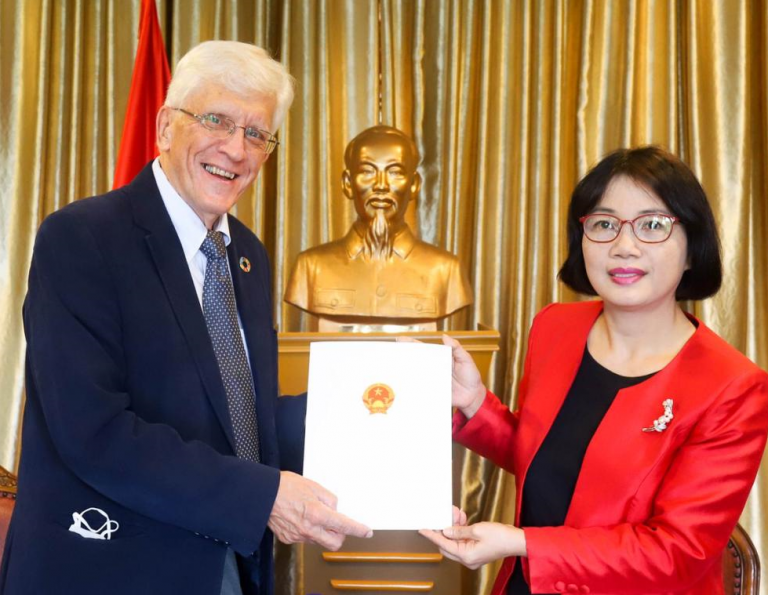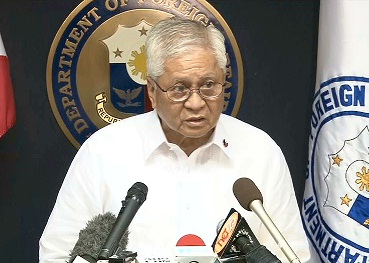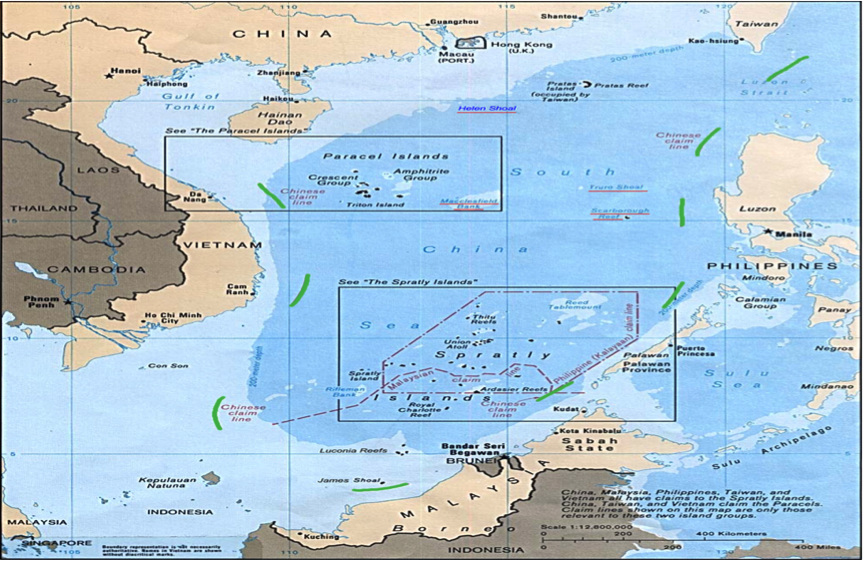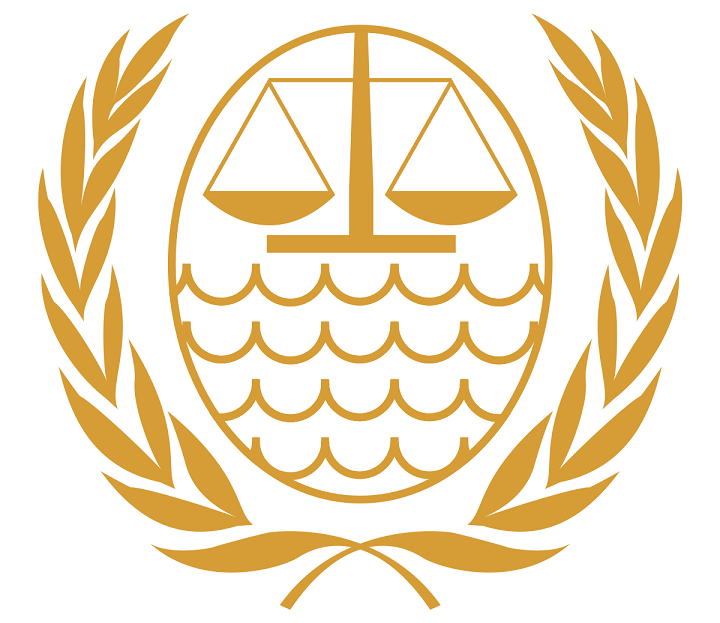There are unmistakable signs that Vietnam may have already reached the point of no return in its maritime dispute with China.
One such sign is Vietnam’s recent nomination of four arbitrators – including that of Professor Robert C. Beckman, a noted Law of the Sea expert based at the National University of Singapore, under Annex VII of the UN Convention on the Law of the Sea.

Vietnamese ambassador to Singapore Tao Thi Thanh Huong
presents to Emeritus Professor Robert Beckman, head of Ocean Law and Policy of
Center for International Law of the National University of Singapore, the
decision of the Ministry of Foreign Affairs of Vietnam as an Arbitrator under
Annex VII of the United Nations Convention on the Law of the Sea. Photo from
NUS CIL website.
That section of the multi-party treaty outlines the default compulsory mode for arbitrating questions of interpretation and application of the UNCLOS or relevant treaties where the parties have not agreed beforehand on any mechanism to resolve such disputes.
Last month, on July 27, a Vietnamese news outlet reported the names of three other nominees, all Vietnamese UNCLOS experts: Professor Nguyen Hong Thao of the Diplomatic Academy of Vietnam and a member of United Nations International Law Commission, Dr. Nguyen Thi Lan Anh, former Vice Chair of the Vietnamese National Border Committee and an associate professor at the Diplomatic Academy of Vietnam, and Dr. Nguyen Dang Thang, the Director of the Vietnamese National Border Committee and a member of the Permanent Court of Arbitration.
Last August 8, the think-tank Professor Beckman had founded, the NUS-Centre for International Law,announced that the Embassy of Vietnam in Singapore earlier formally presentedto him his nomination by the Ministry of Foreign Affairs of Vietnam as an Annex VII arbitrator.
“[T]his is the first time in history that Vietnam has nominated a foreign national to this important position,” said the CIL statement issued two days after the event, citing the Vietnamese ambassador to Singapore, Tao Thi Thanh Huong. “This proves not only the recognition of the knowledge and experience of the nominee but also his impartiality to and support of the peaceful resolution of disputes based on international law.”
In fact, Vietnam had submitted its list of nominated arbitrators to the UN Secretary General much earlier, on May 15 this year.
Under Annex VII rules, only one of its four nomineesmay serve as an arbitrator in a proceeding initiated by Vietnam.
An arbitral tribunal created under Annex VII has five members. The state that instituted the proceedings is allowed to nominate one arbitratorfrom its list of nominees. The respondent state, within 30 days of receiving notice of the proceeding, may also nominate its own arbitrator. The other three arbitrators are to be chosen from nationals of third states by agreement between the parties to the dispute, unless they otherwise agree.
It is likely Vietnam will appoint Professor Beckman to such an arbitral tribunal, given his high standing as an expert. It also remains to be seen whether in such a new proceeding, China will deviate from the strategy it had taken in the Philippine arbitral case.
As it had done before, it is expected to reject a new arbitral proceeding, and insteadinsist on bilateral negotiations.
In November last year, a top Vietnamese diplomat announced that his country is now seriously considering to follow Manila’s earlier lead to bring China to arbitral court over repeated Chinese intrusions in Vietnam’s Vanguard Bank, an oil-rich section of its EEZ.
The Philippines’ 2013 arbitral case against China over the latter’s expansive Nine Dash Line-claim was also founded on Annex VII.
The Philippines however only nominated an arbitrator after it had already filed a notice to China that it was hauling the latter to arbitral court. With China’s decision not to participate in the arbitral proceeding, it was the ITLOS President who appointed the other members of the arbitral tribunal.
ITLOS in Singapore
Vietnam’s move to nominate its own arbitrators also came on the heels of a model agreement signed by Singapore and the International Tribunal on the Law of the Sea (ITLOS) last June 11 recognizing the city-state as an alternative seat for the tribunal.
State parties in the region may now litigate disputes under the UNCLOS in ITLOS proceedings conducted in Singapore, if they so choose.
It is decidedlya much cheaper option for Vietnam than the tribunal’s official seat in Hamburg, Germany, or other tribunals in Europe. In the case of the Philippines, its arbitral case was litigated in The Hague under the supervision of the ITLOS.
China had refused to participate in the landmark Philippine arbitral case –only the eighth such proceeding under Annex VII, which took effect in 1994. The 2016 arbitral ruling handed down by the arbitral tribunal through the PCA in that case is yet the most comprehensive in scope since the ITLOS began hearing procedures under the compulsory dispute settlement mechanism of ANNEX VII.
It established definitive rules on such areas as the legal status of historic rights in relation the maritime entitlements under the, artificial and natural islands, high tide features and low-tide elevations, responsibility for environmental damage, safety in marine navigation, and traditional fishing grounds as against the EEZ.
Indonesia, along with Vietnam, Malaysia, Japan, and Thailand, had each sent a diplomatic observer to the arbitral proceedings at The Hague. Except for Thailand, all of them have a running maritime dispute with China. Too, Vietnam had as well filed a brief with the PCA supporting Manila’s case against China.
Seismic effect of a Vietnamese arbitral case
But in the last four years since the PCA handed down the ruling, the Chinese government has been banking on a game of smoke and mirrors, trying to project to the world that the arbitral ruling and the arbitral court that handed it down were anything but legitimate.
It has combined this with a virtual military occupation of maritime features that, according to the PCA’s 2016 ruling, are unable to support human habitation or economic life and thus, fall within the Philippines’ Exclusive Economic Zone.
For thisreason, even without Chinese participation, a Vietnamese arbitral case invoking key holdings of the PCA on the Philippine arbitral case will have a seismic effect sure to be felt not just in the ASEAN region but well beyond.
Trang Pham, a lecturer at the Vietnam National University, was quoted in an August 22 report by the South China Morning Post as saying that all that needs to be done is a “political decision” by Vietnamese leaders to take its maritime dispute with China to arbitration.
Pham noted that the Vietnamese have already completed all necessary steps that are a preludeto arbitration, from publicly airing its views to submitting a note verbale to the UN Secretary General on the question.
Indeed, since December last year, Vietnam –along with the two other biggest economies in ASEAN, namely Malaysia and Indonesia – have fired a flurry of diplomatic missives to the UN protesting Chinese incursions into their own maritime territories.
They either explicitly cited the UNCLOS ruling in the Philippine arbitral case that invalidated the Chinese Nine Dash Line-claim, or used its key holdings.
The Vietnamese stance today is a far cry from the stance it had taken in 2011, when it signed an agreement with China to resort to negotiations and friendly consultations as means to resolve maritime disputes.
The Chinese constructivist gambit fails
These diplomatic maneuvers, all from what international law calls “specially-affected states” also indicate that China’s “constructivist” gambit against established maritime rules has utterly failed.
A Chinese scholar interviewed for the same South China Morning Post report appears to have acknowledged this. “What is certain is that among Asean countries, those that have territorial sovereignty and maritime delimitation disputes with China are constantly invoking arbitration awards to deny China’s claims to the South China Sea,” said Dr. Ding Duo of the National Institute for South China Sea Studies in Hainan.
He was quick to warn that claimant states in the ASEAN should not allow themselves to be used as pawns in the renewed struggle for regional influence between China and the United States.
“There’s clearly a change in attitude, due in part I think to China being increasingly viewed as a threat to the rules-based order set out in Unclos”, the South China Morning Post reportalso quoted Professor Beckman as saying, “[and] because it is asserting rights in particular to the ocean resources that belong to its neighbours.”
However it mentioned neither Professor Beckman’s appointment as an arbitrator, nor those of the three other Vietnamese experts. The international lawyerand senior American academic – whom the Hongkong-based newspaper calls “the region’s most eminent ocean law scholar” – is professor emeritus and head of the NUS Faculty of Law’s Ocean Law and Policy Program.
Professor Beckman will have his hands full with a Vietnamese arbitral proceeding against China, as is not without its own challenges.
This has to do, according to one expert, with the particulars of the dispute between Vietnam and China, which may not be on all fours with the one litigated by the Philippines. For starters, there are potential overlaps of claims to a continental shelf and an EEZ between China and Vietnam, which may serve to preclude an Annex VII arbitration. There too, are certain Vietnamese-drawn baselines that – it is claimed – do not conform with UNCLOS standards.
Vietnam may however choose to tailor the question onlyto the Vanguard Bank standoff, where China’s claim is founded on its Nine Dash Line-claim. In such a situation, the primary holding in the Philippine arbitral case reverberates: such a claim, being one for historic rights, is incompatible with a coastal state’s maritime entitlements under the UNCLOS.
In fact,the Vietnam Society of International Law (VSIL) had written the Chinese Society of International Law (CSIL) in October last year, invoking the Philippine precedent as for Vietnam’s oil- and gas-drilling operations in the Bank, according to a March 18 article this year by Dr. Ding, the Chinese scholar, also for the South China Morning Post. In the same letter, the Vietnamese international law scholars intimated Hanoi’s intention to follow Manila’s tack by bringing the question to an arbitral proceeding.
Whatever the eventual shape the Vietnamese arbitral claim may take, Vietnam’s nomination of Annex VII arbitrators for its side of the case takes it a step closer to arbitration against China.
*Romel Regalado Bagares, a graduate of the University of the Philippines College of Law and the Vrije Universiteit Amsterdam, teaches public international law at the Lyceum of the Philippines University College of Law. He is also a trustee of the Philippine Society of International Law.



